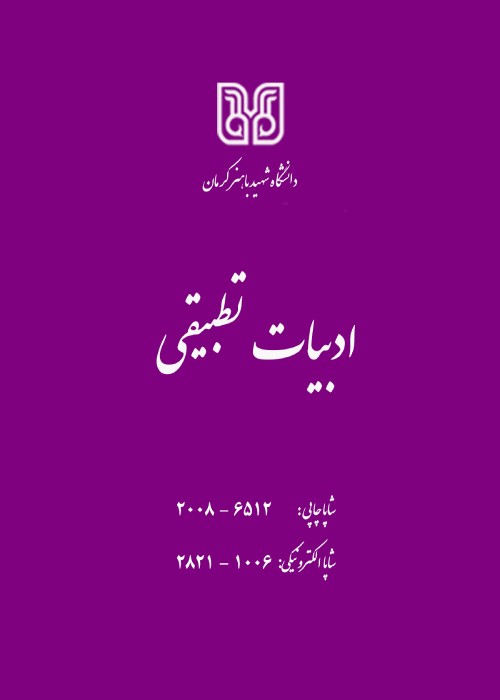Analyzing the Effectiveness of the Translation of Al-Faraj Baad Al-Sheddah from Arabic Poetry, Volume 1
Al-Faraj Ba`Da al-Shiddah (Deliverance Follows Adversity) is a book written in Arabic by Al-Qazi Al-Muhassin ibn Ali Al-Tanuhkhi in the 4th century Hijri. He was known for his strong memory. His son has narrated: “Besides memorizing Jahiliyyah (pre-Islamic) and post-Islamic poems, he memorized jurisprudential issues, hadith, theology, logic, geometry, traditional astronomy, and seven hundred odes by Abu Tamam and Bahtri”. This book was translated into Persian for the first time by Mohammad Awfi, but there is no copy of that translation, except for the anecdotes that he narrated from this book in Jawami ul-Hikayat. Afterward, the book was translated into Persian by Hossein Ibn Ahmad Dehestani in the 7th century to which he added some Persian poems and the conclusion to the anecdotes. Al-Faraj Ba`da al-Shiddah contains anecdotes of miserable people who were released and escaped from difficulties. The purpose of the author in this book, which is full of historical and instructive anecdotes, is to portray the society of his time and its evil traits and also narrate the stories of humane and moral behavior of the characters in his stories and the effect of those behaviors in freeing people from problems. Before al-Qadi al-Tanuhkhi, Madaini compiled a book in five or six pages and narrated the stories of people who were caught by grief and sorrow but then were released from hardship and difficulties and named it “al-Faraj Ba`Da al-Shiddah and al-Zaiq”. Later, al-Tanuhkhi added some parts to this book and compiled it into 14 chapters, each with a different title but with the themes highlighted in al-Faraj Ba`Da al-Shiddah.
To understand the themes in the book al-Faraj Ba`Da al-Shiddah, it is necessary to analyze the Arabic poems in the book, excluding the Arabic poems added by the translator. To do so, it is necessary to determine the era of the poet after correcting the poems while checking the reliability of the translation, their syntactical, rhetorical, and Islamic-Arabic cultural connections with the Persian text, and the entry of various information into the Persian prose to specify the literary genres used in the text of the book.
Abu Ali Muhassin ibn Abul Qasim Ali Tanuhkhi (327-384 AH) was a literary judge and writer of the 4th century AH and the author of al-Nashwaar al-Mahadera, Akhbar al-Mahakara, and -Faraj Ba`Da al-Shiddah. He was born in Basra in 327 AH and grew up there in his literary and hadithologist family and then in Ahvaz. All his instructors during his childhood or adolescence were celebrated scholars, and Abu Bakr Soli is undoubtedly the most eminent one. It is obvious that in the family of a great judge like Abul Qasim Tanuhkhi, religious education was ahead of literary education.
Al-Faraj Ba`Da al-Shiddah (Deliverance Follows Adversity) is a book written in Arabic by Al-Qadi Al-Muhassin ibn Ali Al-Tanuhkhi in the 4th century Hijri. To make his prose better understood and beautified, Tanuhkhi has narrated poems from himself or others that contain some religious, literary, historical, and scientific information. These poems are sometimes expressed by the author himself and sometimes by the characters of the stories. This book was translated into Persian for the first time by Mohammad Awfi, but there is no copy of that translation, except for the anecdotes that he narrated from this book in Jawami ul-Hikayat. Afterward, the book was translated into Persian by Hossein Ibn Ahmad Dehestani in the 7th century under the name of Wazir Ezzeddin Taher bin Zangi Faryoumdi. He also added Persian poems to it and at the end of each story, he narrated the main themes and conclusions. The book contains 13 chapters and narrates anecdotes of miserable people who were released and escaped from difficulties. The purpose of the author in this book, which is full of historical and instructive anecdotes, is to portray the society of his time and its evil traits and also narrate the stories of humane and moral behavior of the characters in his stories and the effect of those behaviors in freeing people from problems. Before al-Qadi al-Tanuhkhi, Madaini compiled a book in five or six pages and narrated the stories of people who were caught by grief and sorrow but then were released from hardship and difficulties and named it “al-Faraj Ba`Da al-Shiddah and al-Zaiq”.
One of the famous anecdotes is related to Abdullah bin Tahir bin Al-Hussein bin Musab bin Zuriq al-Khaza’i, the emir of Khorasan during the Abbasid era. He wrote an ode in praise of his family, Tahir, Hussain, and Musab. He exaggerates that no one is higher in honor than them. Moreover, they had no rival in fighting and conquering the enemies and dominating Baghdad with a violent army:I am the one who you know me and my ancestors
Who are the virtuous of the world and the lords of the land
My grandfather is Musab, a lord from the Prophet’s household
A great man is known for his nobleness and virtues
Hussain was also a lord at that time;
When there was no peace and stability in the land
Abdullah went to Egypt on behalf of Ma’mun in 210 AH. On the way, he restored peace to Damascus and its neighboring areas and defeated his enemy, Muhammad bin Yazid Umayyad. Before that, this person insulted Abdullah by writing an ode praising Tahir, and now he apologized, by referring to one of the verses of Abdullah’s ode, which admired his father’s magnanimity. He stated his Arab bias towards Tahir Ajam as the reason for his action and asked for forgiveness. Abdullah also renounced his sins.
In Al-Faraj Ba`Da al-Shiddah, al-Qazi Tanuhkhi has written some poems in Arabic, which are sometimes narrated by the author and sometimes by the characters in the stories. Except for the poems of Hossein bin Asad Dehestani, most of the poems belong to the Abbasid period, such as al-Qazi Tanuhkhi, Bahtri, Da’abl Khaza’i, Abu al-Atahiya, Imam al-Shafa’i, Rateji, Attabi, Fazl bin Rabi’, Ibrahim bin Al-Mahdi, al-Husain bin al-Dahhak Abdullah bin Tahir, Abu al-Abbas bin Nawaleh, and Muhammad bin Yazid. A few poems belong to the Umayyad period, praising Hammad al-Rawieh, Ashi Hamdan, Abu al-Aswad al-Dauli, Ali bin Abi Talib, and Yazid bin Dabba al-Thaqafi. Some errors can be seen in the translation of poems and Arabic translations, and sometimes the poet’s name, such as Rathi, has been reported by mistake. Poetic translations are also not free from errors. Arabic poems are often used as substitutes for the phrase “these verses” and the like, and sometimes as direct quotations. Some verses are the emphasis and repetition of the meaning of the prose phrases repeated before. Moreover, sometimes the answer or rejection of the poem is related to previous verses. The themes expressed in the poems in al-Faraj Ba`da al-Shiddah include the conspiracies of the courtiers, the hardships of captivity, the divine decree and the instability of the times, the effect of music, the migration of the beloved, the good fortune, the duties of a friend, the recommendation of patience like the patience of Job, avoiding desperation and despondency, expediency, praise of the Prophet’s household and Arabism, and the innumerable cruelty of Bani Umayyad and Ibn Ziyad to the offspring of the Holy Prophet (PBUH). The poems in the book illustrate many Arabic customs and traditions reflecting religious, romantic issues, etc., including themes from the verses and traditions such as the themes of verse 26 of Ale Imran and the prayer of Joshan Kabir, Rami al-Jamarat [Stoning of the Devil], Ihram from the Shajra Mosque, the hereditary nature of the caliphate, and reference to romantic relationships and courtesies in the palaces of the Abbasid caliphs.
- حق عضویت دریافتی صرف حمایت از نشریات عضو و نگهداری، تکمیل و توسعه مگیران میشود.
- پرداخت حق اشتراک و دانلود مقالات اجازه بازنشر آن در سایر رسانههای چاپی و دیجیتال را به کاربر نمیدهد.



